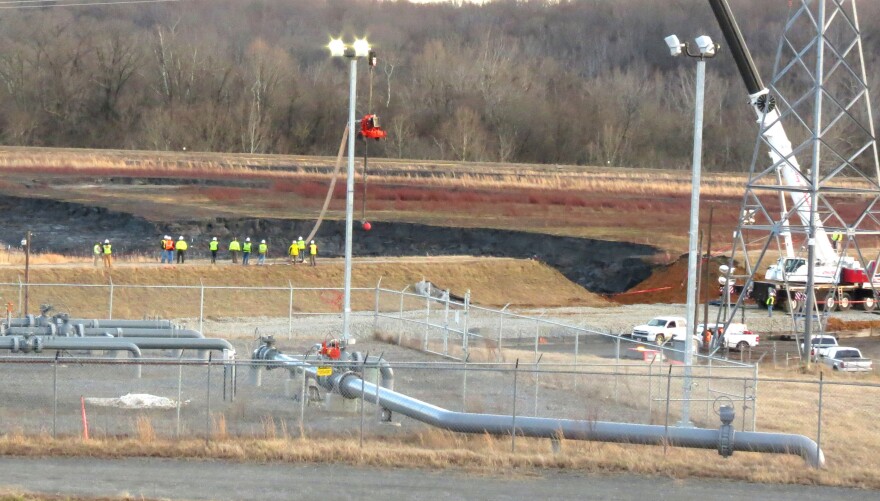A broken pipe funneled 30,000 tons of toxic coal ash into the Dan River in North Carolina earlier this month, turning it gray. The pipe has been plugged, but the spill has reignited a fight over storage of coal ash, and scrutiny of the state regulators responsible for monitoring it.
The U.S. Justice Department began a criminal investigation into North Carolina's coal ash ponds and the state's environmental officials last week. The inquiry widened Wednesday, The Associated Press reports, as federal prosecutors called for 20 state employees to testify before a grand jury.
A Statewide Concern
One-hundred-thirty miles south of the Dan River spill, Mark Levi walks to a dock at the back of his house in Charlotte, on the bank of a different river, the Catawba. About a mile away is the Allen steam plant. Its coal ash ponds are six times the size of the ones that leaked at the Dan River plant.
"To us, the worst-case scenario is the dams on those ash ponds break, and it all dumps in the river right here. And, our backyards — what we chose to live on the lake for — is dead," he says.
Duke Energy is the nation's largest electric company. It owns the Allen and Dan River coal plants, as well as 12 others across North Carolina. All have coal ash ponds built decades ago.
The ash is a byproduct of the coal burned to produce electricity. It contains toxic chemicals such as arsenic. The United States generates more than 100 million tons of the waste per year, but it's not yet regulated by the Environmental Protection Agency.
On any given day, some amount of polluted water seeps from the ponds through earthen dams into groundwater and nearby lakes and rivers.
"The obvious solution is that you can't stop the leaking until you line the holes, so you've got to remove the ash and put it in a lined landfill," says Frank Holleman, a senior attorney at the Southern Environmental Law Center.
Legal Action
The law center has reached settlements with South Carolina utilities to remove coal ash from their riverbanks. But Holleman told state lawmakers Monday that the North Carolina environmental agency has blocked similar efforts.
"They took action to try to prevent us from enforcing the law as effectively as we could," he said.

North Carolina officials have tested the groundwater near Duke ash ponds and found high levels of toxic metals since at least 2010. Officials didn't act until early last year, just in time to prevent a suit from Holleman's organization.
Two months later, the state proposed a settlement. Duke would pay less than $100,000 in fines and conduct studies of the water, which could take years. Resident Mark Levi says that's not enough.
"I think big business has a lot of pull on what happens and how things happen, and let's be honest, Duke Energy is a big player here in Charlotte. They're a big player here in Charlotte and the Southeast," Levi says.
Regulators are re-evaluating that settlement after this month's spill. But Levi distrusts how the current administration has protected water quality. Gov. Pat McCrory worked for Duke for 28 years, and the company has been a major campaign donor. McCrory told reporters earlier this week he's given Duke no special treatment.
"I'm very proud of the job we've done as governor, in that regards, to any company in North Carolina," he said.
He cut off further questions.
Questioning The Regulators
Since McCrory took office last year, the state environmental agency has changed significantly under its new secretary, John Skvarla. Amy Adams spent nine years working for that agency.
"There was this big emphasis put on customer service, but at the same time as the customer service push came about, Skvarla also redefined who our customer was and said that the customer would be the industries and the businesses that we regulate," she says.
Combined with budget cuts, Adams says, that mission statement hurt regulators' ability to enforce the law. She quit and joined environmental group Appalachian Voices last year.
In response, Skvarla says he shares the goal of protecting the environment. He points out that his Department of Environment and Natural Resources, or DENR, is the first in the country to sue a power company over coal ash.
"DENR stepped up to its responsibility and brought four separate actions on 14 coal ash plants in the state of North Carolina," he says.
Duke Energy says water around its coal ash ponds remains within federal limits, although it's re-evaluating its storage.
Still, with the Justice Department's investigation, there's new federal scrutiny of both the company and regulators.
Copyright 2020 WFAE. To see more, visit WFAE. 9(MDAyNDY5MjM1MDEyODE2MzMyMTZmZDQwMg001))


